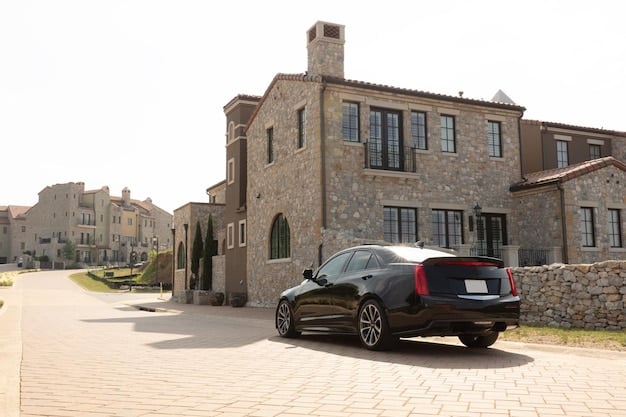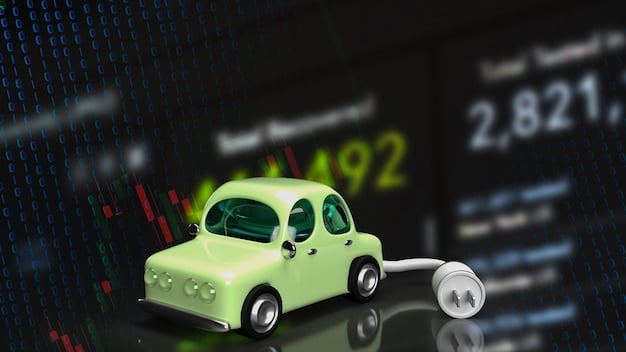Is Leasing a Car in 2025 Still a Smart Choice? A US Buyer’s Analysis

Is Leasing a Car in 2025 Still a Good Option for US Buyers? Leasing a car in 2025 presents a complex financial decision, influenced by market trends, interest rates, and individual driving needs, requiring a thorough analysis to determine its suitability compared to buying.
Navigating the car market can feel like a maze, especially when deciding between leasing and buying. With 2025 on the horizon, it’s crucial to understand if leasing a car in 2025 is still a good option? A financial analysis for US buyers can help you make the right call, and we’re here to equip you with that knowledge.
Understanding the Evolving Car Market in 2025
The automotive landscape is constantly shifting, with technological advancements and changing consumer preferences shaping the future of car ownership. Understanding these trends is essential to evaluate whether leasing remains a viable option in 2025.
Technological Advancements and Their Impact
Electric vehicles (EVs) and advanced driver-assistance systems (ADAS) are becoming increasingly prevalent. These technologies impact vehicle depreciation, a crucial factor in leasing.
Changing Consumer Preferences
Subscription services and shared mobility are gaining popularity, offering alternatives to traditional car ownership. Many consumers now view cars differently, thus opening up a new perspective when approaching the car market.
- EV Adoption: As electric vehicles become more mainstream, leasing can provide a cost-effective way to experience new technology without long-term commitment.
- Subscription Models: Services offering short-term car access challenge the traditional appeal of car ownership.
- Autonomous Driving: The advent of self-driving features may influence depreciation rates and consumer willingness to own vehicles outright.
The market of 2025 will likely feature a blend of traditional car ownership, leasing, and innovative mobility solutions. It’s important to understand these considerations before opting for leasing.

The Financial Implications of Leasing in 2025
Delving into the financial aspects of leasing provides clarity on whether it aligns with your budget and goals. By analyzing key elements such as depreciation, interest rates, and fees, you can make an informed decision.
Depreciation and Lease Payments
Depreciation is a major factor in lease payments. Understanding how different vehicle types depreciate is crucial for estimating lease costs.
Interest Rates and Leasing
Interest rates, also known as money factors in leasing, significantly impact monthly payments. Monitoring these rates is essential for securing a favorable lease deal.
- Capitalized Cost: Negotiating the vehicle’s price (capitalized cost) is vital, as it directly impacts monthly lease payments.
- Residual Value: Higher residual values (the car’s estimated worth at the end of the lease) result in lower monthly payments.
- Fees and Taxes: Be aware of all associated fees and taxes, including acquisition fees, disposition fees, and sales tax.
Effective financial planning necessitates a comprehensive understanding of depreciation, interest rates, and all associated costs. Doing so will allow you to properly manage your cash flow.
Leasing vs. Buying: A Detailed Comparison for 2025
Deciding between leasing and buying requires a thorough comparison of the advantages and disadvantages of each option, tailored to your circumstances.
Advantages of Leasing
Leasing offers benefits such as lower monthly payments and the ability to drive a new car every few years.
Advantages of Buying
Buying provides long-term ownership, the freedom to customize your vehicle, and the potential to build equity.
- Upfront Costs: Leasing typically requires lower upfront costs compared to buying, making it accessible for those with limited savings.
- Customization: Buying allows you to modify your vehicle to your liking, whereas leasing often restricts customization options.
- Mileage Restrictions: Leases come with mileage limits, which can result in penalties if exceeded, while buying offers unlimited mileage.
Consider your priorities and driving habits to determine which option aligns better with your needs, whether that’s the appeal of driving a new car more frequently by leasing, or accumulating equity through buying.
The Impact of Electric Vehicles on Leasing in 2025
The rise of electric vehicles presents unique considerations for leasing, influencing costs, incentives, and long-term value.
Government Incentives and Tax Credits
Government incentives and tax credits can significantly reduce the cost of leasing an EV, making it a more attractive option. These incentives are constantly changing though, especially with time.
Battery Technology and Depreciation
Advancements in battery technology impact the depreciation rates of EVs, affecting lease payments and residual values.
Leasing an EV in 2025 offers several potential advantages. For example, you are shielded from battery degradation concerns, and can also take advantage of incentives. Keep in mind that those incentives may not last.
How to Negotiate the Best Lease Deal in 2025
Successfully negotiating a lease requires careful planning, research, and a clear understanding of the factors that influence lease terms.

Research and Preparation
Before heading to the dealership, research vehicle pricing, lease rates, and available incentives. Bring all your info in with you to support your point.
Negotiating the Capitalized Cost
Negotiate the vehicle’s price (capitalized cost) just as you would when buying, aiming for the lowest possible price.
- Money Factor: Understand the money factor (interest rate) and try to negotiate it down to secure a better deal.
- Lease Term: Choose a lease term that aligns with your driving needs and budget, considering the potential for mileage overage charges.
- Multiple Quotes: Obtain quotes from multiple dealerships to compare offers and leverage competitive pricing.
Effective negotiation skills can save you significant money over the lease term. You shouldn’t feel afraid of walking away if things don’t go your way.
Making the Right Decision for Your Needs in 2025
Ultimately, deciding whether to lease or buy in 2025 depends on your unique financial situation, driving habits, and preferences.
Assess Your Financial Situation
Evaluate your budget, credit score, and long-term financial goals to determine the most suitable option.
Consider Your Driving Habits
Assess your average annual mileage, driving style, and preferred vehicle features to make an informed decision.
Carefully weigh the advantages and disadvantages of leasing versus buying to determine which option aligns with your lifestyle, financial goals, and long-term transportation needs. Assess all of those factors, and you should come to a viable conclusion.
| Key Aspect | Brief Description |
|---|---|
| 💰 Affordability | Leasing often has lower monthly payments, attractive for budget-conscious individuals. |
| 🔄 Flexibility | Leasing allows driving newer models more often, great for tech enthusiasts. |
| 📈 Market Trends | EV incentives can make leasing financially advantageous in 2025. |
| 🤔 Considerations | Mileage limits and wear fees need consideration when comparing with buying. |
Frequently Asked Questions
▼
Key factors include technological advancements in EVs, government incentives, interest rates, and changing consumer preferences toward mobility solutions beyond traditional ownership.
▼
EVs offer unique leasing benefits due to government incentives and rapid tech advancements. This shields lessees from long-term battery degradation concerns and provides frequent upgrades.
▼
Leasing downsides include mileage restrictions, wear and tear fees, and the absence of equity accumulation. It’s not ideal for those driving long distances or seeking asset ownership.
▼
Customization options for leased cars are generally limited. Lessees must return vehicles in near-original condition to avoid penalties, restricting modifications like paint or significant aftermarket additions.
▼
Negotiate the capitalized cost, money factor, and lease term armed with thorough market research and multiple dealer quotes. Understanding lease terms and costs is crucial for a better deal.
Conclusion
Deciding whether leasing a car in 2025 is still a good option for US buyers requires a comprehensive understanding of evolving market dynamics, financial implications, and personal needs. By carefully evaluating these factors, you can make an informed decision that aligns with your circumstances and goals.





